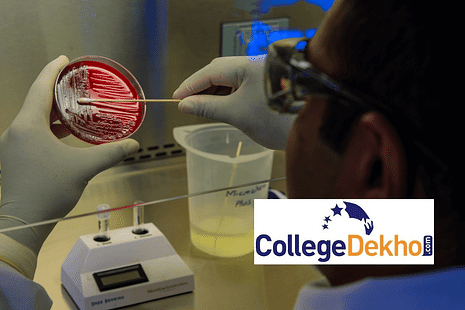BSc Microbiology and BSc Biochemistry are two popular courses at UG level. Check the detailed comparison and differences between BSc Microbiology and BSc Biochemistry in this article.

BSc Microbiology and Bsc Biochemistry are very popular courses for the students who want to make their career in the field of science. After Class XII, students move towards choosing a course in which they are interested. But the difficulty is that they are confused because of the availability of various courses offered in different institutes. At this age, many students are also not aware of the scope of many courses and the role and responsibilities of professional from a specialised stream.
In this article, we have made a comparison between BSc Microbiology and BSc Biochemistry for science students who are planning to opt for the Bachelor of Science (BSc) course after the intermediate studies.
BSc Microbiology and BSc Biochemistry are the popular BSc course to choose after Class 12 PCB . Both are just as important courses and have significant scope for higher education, jobs and research. However, the curriculum and its scope are widely separated.
Check the complete article for the reasons to pursue one of the two courses and job roles that you can opt after the successful completion of an undergraduate degree programme.
BSc Microbiology vs Biochemistry: Course Comparison
Name of the Course | BSc Microbiology | BSc Biochemistry |
|---|---|---|
Duration | 3 years | 3 years |
Eligibility | Must be passed in class 12th in PCM/PCB with a minimum aggregate of 55% from a recognised board | Must be passed in class 12th in PCM/PCB with a minimum aggregate of 55% from a recognised board |
List of Entrance Exams | Mahatma Gandhi University Common Admission Test[MGU CAT] Aligarh Muslim University Entrance Exam [AMUEEE] Assam University Entrance Exam [Assam CEE] | Christ University Entrance Test (CUET) Mahatma Gandhi University Common Admission Test[MGU CAT] Aligarh Muslim University Entrance Exam [AMUEEE] Assam University Entrance Exam [Assam CEE] Lovely Professional University Entrance Exam [LPUNEST] |
Admission Process | Admission is done either through counselling for a state-level/ institute level entrance test or directly on the basis of merit obtained by the candidate in the qualifying exam. | Admission is done either through counselling for a state-level/ institute level entrance test or directly on the basis of merit obtained by the candidate in the qualifying exam. |
Fees | 20k to 3 lakh | 30k to 2.5 lakh |
Top Job Roles after Graduating | Microbiologist, Project Manager, Research Scientist, Medical Writer, Professor | Senior Executive Assistant, Product Development Manager, Business Analysts, Environmental Consultant |
Top Recruiting Organizations | Accenture Cipla Inc. Biocon International Business Machines (IBM) Corp Glenmark Pharma | Computer Sciences Corporation SGS India Private Limited Tata Consultancy Services Limited (TCS) Roche Diagnostics Corp. Cognizant |
Career Growth | The candidates can pursue different jobs after pursuing a degree in BSc Microbiology including a private job, or a government job. The candidates from this course have a higher scope in Government based research institutes. | The candidates have higher career growth in BSc Biochemistry due to increasing demands in the industries. The candidates can go for either private or government based jobs. |
Highest Salary Range | 6 LPA | 6 LPA |
Average Salary | 4 to 6 LPA | 3 to 6 LPA |
Top Colleges | Lovely Professional University | Calicut University |
List of Government Jobs | PSUs Government Technical Institutions Government Research Institutes Health Programs | Cancer Research Institute Fisheries Forensic Science Institutes National Blood Services Public Health Laboratories |
List of Government Recruitment Tests | IAS IPS CGL(Combined Graduate Level) IFS | IAS IPS CGL(Combined Graduate Level) IFS |
Related Links | BSc Chemistry vs BSc Microbiology - Which is the Best Course after Class 12? | BSc Biochemistry vs BSc Chemistry - Which is the Best Course after Class 12th? BA. vs BSc - Which is the Best Option after Class 12th PCM? A Complete Guide to Delhi University BA., BCom BSc Admission 2020 |
Reasons to pursue BSc Microbiology
Following are the strong reasons to pursue a BSc Microbiology course after Class 12th:
BSc Microbiology is a good course for students who are interested in exploring various microorganism and their pathogenic potential. The course gives them scope to find solutions to pathogenic problems and serve the nation.
BSc Microbiology is a career-driven programme that helps students shape their intellect to perform experiment and research.
Candidates with a degree in Microbiology degree are in demand in various sectors like medicine, pharmacy agriculture, food industry, research, environment etc in India as well as abroad.
After the competition of BSc Microbiology course, candidates can go for a master’s degree in relevant field or work in the pharmaceutical industry, laboratories, food industry etc.
BSc Microbiology degree holders are highly in demand to contain various types of disease caused by an existing or new borne microorganism.
Also Read: BSc Chemistry vs BSc Microbiology
Career Scope of BSc Microbiology
BSc Microbiology is the fundamental course to learn about the evolution of the microorganism and their relation shop with the ecosystem. The course helps students learn about various agents of diseases caused by a microorganism.
Candidates who want to grow in a career with the same discipline must pursue MSc Microbiology course. After appropriate knowledge and skills, the candidate will have options to choose from one of the following job roles:
Microbiologist
A microbiologist is a person who studies various microscopic organisms like including bacteria, fungi, algae and virus.
He/ She is responsible to diagnose and prevent disease/ infection caused by microorganisms. They work in research centres to perform experiments research. The . Clinical immunologist handles patents suffering from disease/ infection caused by a microorganism.
Highly specialised microbiologist works with the scientist to develop medicine/ vaccine to contain existing or new borne disease caused by microbes.
Bacteriologist
A Bacteriologists specifically deals with analyses of bacteria. They study the relationship of bacteria with the environment and their impact on habitat. He/ She identifies and analyses various types of bacteria found in air, water and land. They collect samples and perform test and experiments in laboratories.
Virologist
A Virologist studies about viruses and their impact on human, animal and plant life. They are mostly involved in analysing infectious virus and collaborate with scientists to develop medicines and vaccines to fight against diseases caused by a microorganism.
A Virologist work in research centres, laboratories and hospitals and their demand is high due to the spread of various infectious disease caused by existing and new borne viruses.
Immunologist
An immunologist is a person who analyses the immunity system of human and animals to understand how it functions to fight against the disease. The immunity varies according to the age and geographical location of the person.
An immunologist provides the most appropriate guidance about the immune system the functions differently against various disease/ infection caused by different microbes.
Mycologist
A Mycologist is a professional who specifically studies fungi and disease/ infections caused by them in living beings. They are responsible to discover and segregate useful and harmful fungi. Their work and research help companies and industries to manufacture products by the treatment of fungi.They play a role in making the economy better by helping industries and company.
Read Also: List of BSc Microbiology Colleges in India
Reasons to pursue BSc Biochemistry
Following are the reasons why you should pursue BSc Biochemistry course after Class 12th:
BSc Biochemistry is a good course to opt for students who have an interest in exploring the chemical composition of living beings. Those who have clear fundamental concepts in Biology and Chemistry can opt this course.
The course is taught keeping in mind its practical implementation. It involves laboratory work and research-oriented assignments and projects.
BSc Biochemistry is a specialised life science course and it has a huge contribution in various sectors like medical and healthcare, agriculture, science and technology, forensic etc.
Candidates who complete BSc Biochemistry can opt for MSc course of desired discipline followed by PhD from reputed university/ institute in India and abroad.
With the expansion of healthcare, agriculture and industries, the demand for BSc Biochemistry high to perform laboratory test and experiment for the manufacturing of medicine, chemical products etc.
Also Read: BSc Biochemistry vs BSc Chemistry
Career Scope of BSc Biochemistry
BSc Biochemistry is the study of chemical composition and reactions in living organisms. The course is the combination of biology and chemistry to develop a solid background and practical learning for research and experiments in future in relevant discipline.
The course helps candidates to opt for one of the job roles discussed below:
Biochemist
A Biochemist is a person who studies chemical an biological process of living beings that involves cellular development, heredity and disease.
They analyse the chemical process happening in living cells and through it understands the effect of medicines and effect on different body types. They analyse and improve the quality of life at the cellular level.
They are responsible to conduct the experiment and understand the genetic and hereditary traits of a person. They suggest the most effective medicines for the treatment of human life.
Analytical Chemist
An Analytical Chemist is a person who is responsible to analyse the composition an element and the chemical reactions. They play an important role in the pharmaceutical industry where the reactions of chemicals are essential to manufacturing medicine and drugs.
Their role is essential to improve procedures and generate reports for research and experiment.
Toxicologist
A toxicologist is a person who is responsible to test samples like fluids of the human body to analyse the presence of chemicals. They collect samples and work in laboratories to test them.
The main role of a toxicologist is to analyse the presence of any toxic substances in the body like drugs, alcohol poisons, poisonous gas, metals etc. Their roles are important in court cases, investigation and saving lives of people who have consumed hazardous chemicals.
Forensic Scientist
A Forensic scientist is a person who performs test and experiments to investigate crime scenes. They are involved in chemical reactions of substances collected from suspected locations for evidence.
They use scientific techniques, microscopic experiments, calculation and principles to reach a conclusion. A Forensic scientist work in chemical laboratories to perform experiments. Their roles are essential to resolve crime and disputes.
Also Read : List of BSc Biochemistry Colleges in India
Hope the above discussion will help students opt the most appropriate BSc course after Class XII. For the Latest educational News and Updates, stay tuned to CollegeDekho !
Are you feeling lost and unsure about what career path to take after completing 12th standard?
Say goodbye to confusion and hello to a bright future!

Was this article helpful?




















Similar Articles
DU NCWEB 1st Cutoff 2025: College-wise Cutoff PDF, Admission Process
TS DOST Admission 2025: Seat Allotment (Phase II - June 13), Registration, Web Options, Eligibility, Documents Required, Fee
CSIR NET Question Paper July 2024 (Available): Memory-based Questions with Answer Key PDF Download
AIFSET 2025: Registration (Started), Exam Dates (Out), Eligibility, Admission Process & Latest Updates
CBSE Class 12th Science Syllabus 2025-26 - Check CBSE 12th Science Subject-wise Syllabus
TS DOST Seat Allotment 2025: Release Date, Steps to Download, Reporting Process